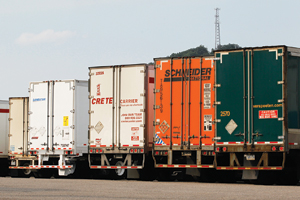Senior Reporter
July Trailer Orders Drop Vs. June

This story appears in the Aug. 31 print edition of Transport Topics.
New trailer orders in July slid to 20,313 from an “unsustainable” pace in June and came to rest in numbers typical for the season, according to ACT Research and other market observers.
Still, the July orders represented a 7.4% gain compared with year-earlier activity, ACT said.
Last month’s U.S. net orders total marked a 27% decline from 27,831 in June, when orders surged to their highest point in two decades — riding strong demand for refrigerated and dry vans as build slots disappeared for 2015 and began to fill in for 2016.
“Freight levels can support the fleets’ investment plans. Rates are solid, down a little, but still solid. Fleets have a good bottom line. Our view that 2015 will be the best trailer market since the late 1990s remains unchanged,” ACT analyst Frank Maly said.
The July orders also marked the second consecutive month of year-over-year increases and were just below the year-to-date average of 22,299, BB&T analyst Thomas Albrecht said.
Albrecht called the July order total “seasonably solid.” He added that “trailer demand remains healthy, and orders should pick up in the fall again as they typically do.”
ACT’s trailer forecast is a 14% gain this year to 307,000, then a 3% decline next year to 297,000, followed by a decrease of 8% to 274,000 in 2017, he said.
FTR reported new orders in July as slightly higher, at 20,400.
The research firm said that, although orders dipped, dry van orders in July were still good on “a seasonal basis, and refrigerated van orders exceeded expectations again.”
FTR Vice President Don Ake said, “We have indications that the market is peaking, but there is no evidence that it is going to drop significantly next year. It looks like a soft landing in general.”
Alan Briley, vice president and general manager of Fontaine Trailer Co., which makes flatbeds, also said the orders in July were in line with seasonal expectations.
“July certainly was what we would consider a typical summer month when it comes to new-order demand,” Briley said.
He said the majority of Fontaine’s sales are to its dealer network, which has done a very good job of planning for this busy period.
One factor that has cut into orders, however, is the strong U.S. dollar. It has disrupted markets in Canada, he added, noting the Canadian and U.S. dollars had been within a dime of parity for the past several years. But when he checked earlier in August the exchange rate was C$1.31 for $1.
That equates to a 31% price increase for customers in Canada, he said.
Nonetheless, he said, he was anticipating “another solid year for flatbeds in 2016.”
David Giesen, Stoughton Trailers’ vice president of sales and marketing, said customers are pulling orders ahead of the normal cycle because the manufacturer’s backlogs “are out further than what is normal.”
He also said that, in a cycle like this, balancing demand from dealers and fleet customers was important.
“In reality, what we do is protect some space for our dealers. In a year like this or next, theoretically, we could fill up just with fleet business and leave nothing for them. So, that is not a good thing to do for the long term. But all of that being said, we are forcing our dealers to plan orders further ahead than they’ve ever planned.”
No longer are the trailer makers just building inventory, like they were a couple of years ago, that dealers could “feed” from, he added.
“If you did just fleets and you didn’t service your dealers, you wouldn’t keep them,” Giesen said, however. “So when the time for fleet business drops down, you wouldn’t have a network to sell trailers to,”
As for his outlook, he said, “2016 is shaping up to be as strong as 2015, which was one of the strongest years in the last 10.”
Jack Beville, president of Florida Utility Trailers, has been in business for almost 40 years and has three locations along the Interstate 4 corridor in central Florida and one in the Miami area. He said he sees demand remaining strong at least through the middle of next year.
“Our core customers are buying — we’re renting, we’re selling. Every aspect of our business is very strong right now,” Beville said, “with the reefer business being the strongest category.”


